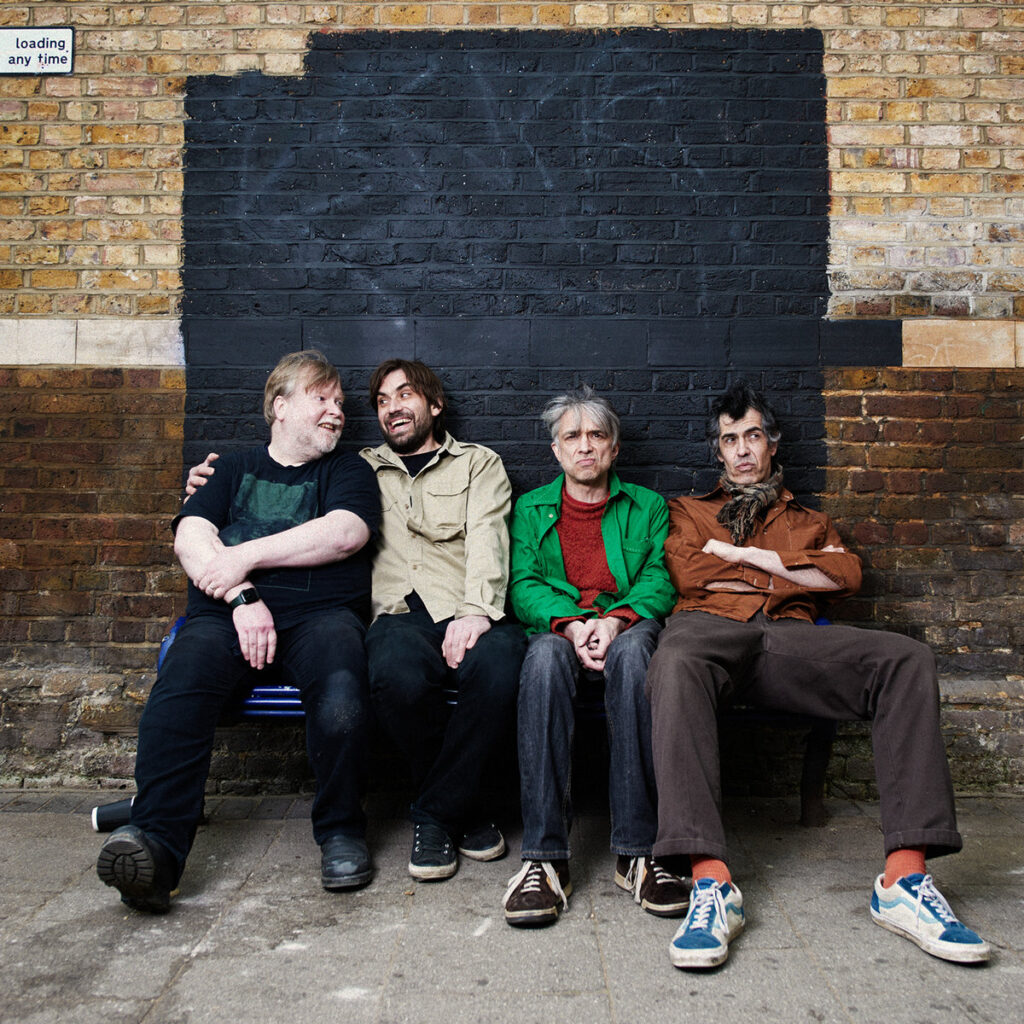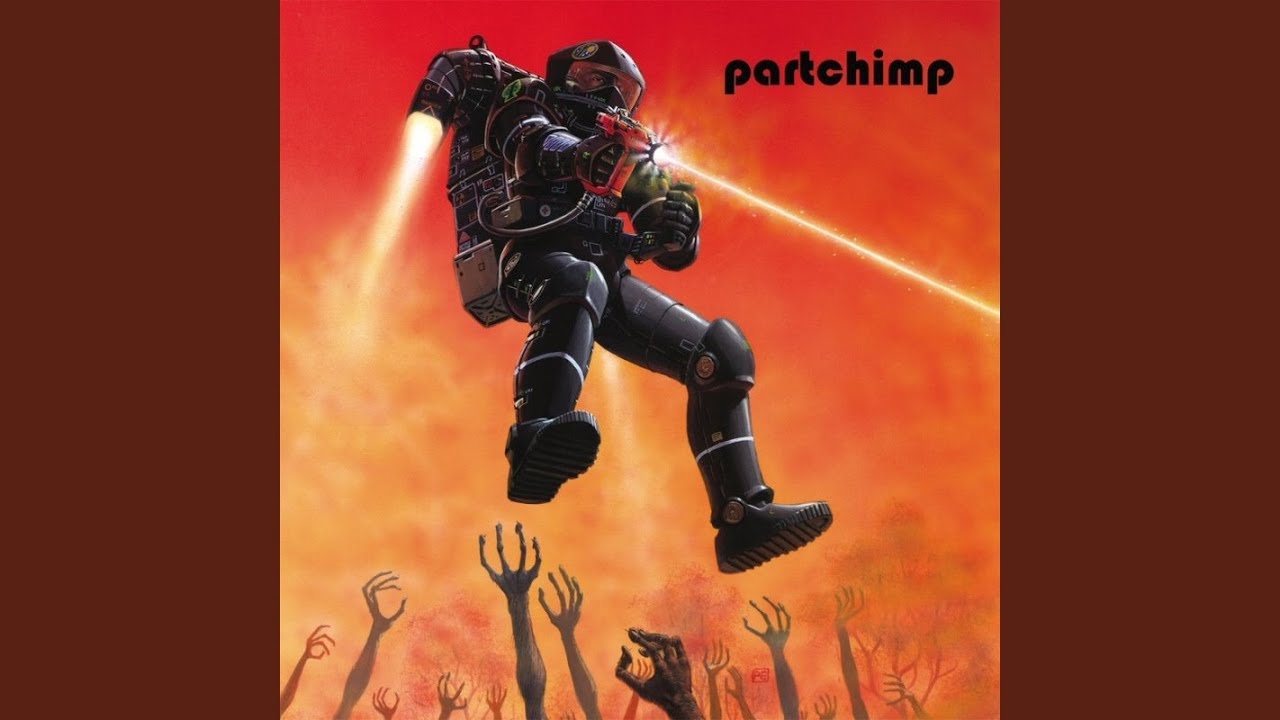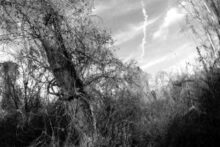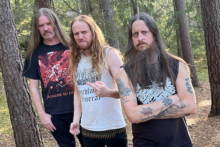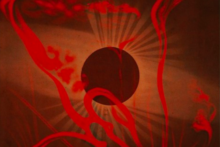Part Chimp play with Rainbow Grave, Dawn Terry, Haress & more on 26 July
As David St Hubbins opined, there’s such a fine line between clever and stupid. Part Chimp have gleefully stomped that line into dust for a quarter of a century. “I say quite a lot in rehearsals, ‘Can we make it more stupid?’,” grins Tim Cedar, Chimp singer and guitarist. “I’ll say, ‘Jon, just do something a bit more stupid’. I sometimes think Part Chimp is stupid music made by very clever people,” he adds, though it’s absolutely clear he doesn’t actually think Part Chimp are very clever people. Though they are.
Cedar’s on a six-way videochat tonight including Chimp drummer Jon Hamilton, guitarist Iain Hinchliffe, bassist Robin Freeman, and bassist-at-large Joe McLaughlin. The group first crawled from the wreckage of Ligament, glorious scuzzers loosely connected with the 90s Lurch scene then-happening in Camden. Ligament were different from their sleazy brethren, plying drily hilarious, thrilling and inventive noise, not unlike Pavement getting mashed-up by a bulldozer.
That band split around the turn of the millennium, after bassist Ray Hill – forced to choose between a Mogwai tour or his day-job as soundman on reality TV show Shipwrecked – chose telly. His bandmates, Cedar and Hamilton, signed up to the tour anyway, bringing ex-Scarfo bassist Nick Prior aboard. “We started Part Chimp literally the weekend after the last Ligament show,” remembers Hamilton. “Our first show was a Christmas gig. It was pretty bad. We did a jam on Little Drummer Boy.”
A few months later, with another Mogwai tour on the horizon and requiring “more guitar talent”, the trio thought of Hinchliffe, who had crossed paths with Cedar and Hamilton when his band, Sawyer, opened for Ligament and Killdozer in his hometown of Edinburgh. By this point he had relocated to London, and reached out to Cedar by sending a letter to Penthouse – not the grumble magazine, but the sublime blues-punks for whom Cedar played drums. “Tim invited me to a rehearsal in the garage of Esme, the bassist of Penthouse,” remembers Hinchliffe. “That’s where we wrote the first album. I played my first gig with Part Chimp at Shepherd’s Bush Empire. It was quite a trial by fire.”
That first album, the sludgy, spoonerific Chart Pimp, arrived in 2003, and was grisly and magnificent, although only two tracks, the aptly titled B1 and B2, featured what would become their secret weapon: Cedar and Hinchliffe’s brutally amplified guitars tuned to the key of B. The group would convert fully to “B” on 2005’s roaring I Am Come (“The title’s something Jesus said, isn’t it?” grins Cedar. “And it sounds kind of dirty as well”). “The B thing involved tuning every string of the guitar to B,” Hinchliffe explains. “Between Tim and myself, we’re almost playing chords together, or intervals, or harmonies. It’s stupid, and brilliant. Which is a lot of what the Chimp is about.”
“It’s a drone-y, chime-y thing,” Cedar adds. “It made a couple boring songs a lot more interesting. I was like, ‘Oh, hello – boring songs more interesting? Might do this a bit more.’ Four albums later…”
On I Am Come, and the albums that followed, Part Chimp leaned hard into a penchant for sonic extremism – louder than all comers, their bloody-minded worship of the riff has nevertheless been tempered by an absence of macho bollocks and a simple joy in the absurdity of what they do, placing them firmly within the orbit of the similarly noise-a-licious, similarly machismo-intolerant Lightning Bolt. “We’ve never taken ourselves that seriously,” agrees Cedar. “If it’s not fun, it doesn’t feel right, and there’s no point playing it.”
“The loudness was never intentional, either,” adds Hinchliffe. “In Esme’s garage, Jon played so loud, because that was just how he played. So we turned up, and then Jon would play even louder. It just… happened.” Hinchliffe’s quick to define the Chimp as distinct from “bands that were deliberately trying to make people’s eardrums bleed, like Swans or Motorhead. Don’t want to sound wanky, but what we do is more textural somehow. Because we’re all playing in B, Tim plays part of a chord, I play part of a chord, and it’s fun.”
For all their rejection of machismo and rock’n’roll bullshit, however, Part Chimp do share something in common with St Hubbins’ group, Spinal Tap: a chronic instability within the rhythm section. The group’s five albums have featured four bassists. Prior quit after the first album, replaced by Joe McLaughlin, of Liverpudlian synthers Kling Klang, who responded to a round-robin email searching for a new four-stringer in advance of a booked tour. “So I came down on the train, bass in a bin-bag and a tape of the new songs in my Walkman,” McLaughlin remembers. “We had two practices, and then the first gig was at All Tomorrow’s Parties, broadcast live on the fucking radio on John Peel.”
McLaughlin stepped away before the group cut their third LP, 2009’s Thriller, replaced by Tracy Bellaries, who tuned her bass to “B”, completing the process Part Chimp had begun all those years before. McLaughlin returned for 2017’s IV, then relocated to the US, his place now taken by Robin Freeman, whose old bands had been produced by Cedar. “I got shanghaied into Part Chimp on the way home from one of our sessions,” Freeman grins. “It’s interesting, joining a band that’s already been going 17 years. It’s quite a lot of songs to learn.”
And there are more songs to come, with a sixth Chimp LP on the distant horizon. Freeman hints some of this new material might get an early debut when they headline Baba Yaga’s Hut’s 19th anniversary throwdown at Corsica Studios on 26 July, while Cedar promises: “The rock cake is baking”. Currently, it has no title; maybe this is the year Thanks A Bunch, the working title for 2021’s Drool LP, finally sticks. “Thriller was almost titled Sister Act,” says Hinchliffe. I Am Come, meanwhile, was nearly called Hello Fuck Off. Great titles all.
To have completed 25 years of such extreme loudness boggles the Chimp’s collective mind as much as they’ve mangled my high-register hearing. “It seems like longevity comes from the absence of crazed-up behaviour or people thinking that they’re Golden Gods and jumping off roofs,” says Hinchliffe. “The reason it’s lasted that long is, we lack that macho need to prove something, or be a diva, or have some kind of attitude. We’re just grinning like idiots, every single gig.”
‘Iron Pond’, from Chart Pimp (2003)
Tim Cedar: I really wanted to do a song that sounded a bit like Iron Monkey and Bardo Pond, mashed together, and call it ‘Iron Pond’. And that’s what this sounds like, this melting together of worlds. It’s so much fun to play these sludgy songs, and to see how sludgy we can get them. There’s this real big pregnant pause near the end, and we all look at each other, waiting to come back in, and that pause gets longer and longer every time we play it.
Chart Pimp’s not on streaming. Why?
Jon Hamilton: I asked [Rock Action, the Chimp’s former label] about that, and they said they don’t have the cover art. So I sent them some cover art, and they still didn’t put it up. This is years ago, as well. I should badger them, but I can’t be bothered.
Your early records are £££s on vinyl on Discogs. Are you tempted to reissue or repress?
JH: We’ve asked them to repress the albums a few times, but they’ve said no. They’ve been out of print for 15 years, they only pressed-up like 200 copies of them in the first place, and they’d have to start the process from scratch, so it would cost loads of money. And it turns out we still owe Rock Action quite a lot of money. But if they ever want to do it, we’d be totally up for it.
‘War Machine’, from I Am Come (2005)
TC: Another early experiment in B. I was listening to a lot of Polvo and I loved those detuned guitars, and tried to make it very melodic as well. It’s actually quite a nice, poppy tune, with some nice bonkers drum bits in it. I’m always trying to make Jon play more bonkers stuff. I stole one of the lyrics from my good friend Al, who I’d been in a band called Iron Cat with. ‘I was born in the witch’s cauldron’. Always loved that line.
Joe McLaughlin: It has quite the bombastic intro, isn’t it? [The track is preceded on I Am Come by ‘Bakahatsu’, a deafening, minimalist noise track]
Iain Hinchliffe: ‘Bakahatsu’ made somebody sick immediately when we played Nottingham. We went on, and Jon went ‘click, click, click, click’ with his sticks and then everything was just ‘WOOOOSH’, valves fully open, and they were physically sick. We’re a force to be reckoned with.
‘Dr Horse’, from I Am Come (2005)
IH: ‘Dr Horse’ is one of those songs where a grin appears on my face as soon as we start playing it. The arrangement is so weird, and our songwriting is not normal. I don’t think we’ve ever written a song that went, verse, chorus, verse, chorus, chorus, chorus, finish. ‘Dr Horse’ is a great example: like, why does it change that way? And I think, actually, it changes that way just to make it difficult for Bob when he was trying to learn all our songs.
Robin Freeman: Pretty much.
IH: It feels organically like the Chimp somehow, though – that we do something that isn’t being done by other people. It’s nothing like stoner rock, or genre metal, or the kind of Pigsx7 thing of tapping a little bit into macho culture. It’s all really silly, but also something you can envelop yourself in. It’s got highs and lows and slow bits and everything. Every time it’s in the set, I smile.
TC: Dr Horse is about as operatic as I get
‘3000000000000000 People’, from I Am Come (2005)
TC: It’s a great riff. It’s just so much fun. It’s… Help me out, guys! if I just say, “Oh, really like this song, it’s good fun to play” every time, this won’t be very interesting!
JM: It’s quite a reductionist riff, quite boiled down, for quite a long time, and then youse have got your melodies on top, and the textures. It’s simple, but it does get heavier.
TC: The big fat ending is always really good fun. And it leads into the reprise of ‘Bakahatsu’ on the album, and we often do that live as well, and it turns into another song that’s something else entirely, that we’ve never really quite managed to record.
The first time you listen to this song, it just seems crazy simple, like a football chant. And then later, with the headphones on, you hear all the layers to it, all the complexity, and you get lost in it.
RF: A lot of Chimp songs are like that. It’s about the feeling. You can see it in the audience, when this song starts, people begin swaying – it’s a mover. It’s a joy to play.
‘Trad’, from Thriller (2009)
JM: Thriller‘s Tracy’s record, and when she joined, the sound changed – it actually got heavier, if that were possible.
TC: Tracy was ideal. She did some weird stuff that just worked – I can’t explain it, but it was great.
IH: She’s the most macho person that’s been in Part Chimp. She brought a rock & roll element that wasn’t really there until she was there. She started by tuning the bass down, and it did change things. ‘Trad’ was an accident – we were playing something, and Tracy didn’t play it the way that the rest of us were playing, and we met in the middle somewhere. It’s just a weird rhythm, and if Tracy hadn’t been in the band, that wouldn’t have happened. She really did bring something that changed the sound.
TC: We were trying to write a stoner-rock song. “The kids love stoner rock, let’s write one!” But again, because of the B thing, it sounds weird. We Chimped it.
‘Dirty Sun’, from Thriller (2009)
JM: That’s a fuckin’ great tune. I’m saying that as a fan. But it is, isn’t it? It’s a beast.
JH: It’s got legs. It’s on some playlists, so it’s one of our most listened-to tunes.
IH: It’s on an episode of the American cop show The Rookie. Which is great, because we get some cheques based on the syndication of that show.
TC: I saw the episode. The scene they use it in was really long, and it doesn’t really work.
JH: I quite liked it, this really doomy riff, and you’ve got this sinking feeling, because the evidence is missing, or something.
Tim: More cop shows should use our music.
Iain: We’d played a bunch of shows with [Athens, Georgia noisers] Harvey Milk, and going to that high note from the stupidly low riff in ‘Dirty Sun’ was absolutely ripped-off from Harvey Milk. They were so inspirational, how they’d be like, ‘We’re gonna do it our way’. And that feels like a Chimp thing, too. We couldn’t do things anyone else’s way – that would get rid of all the pleasure and the joy and the fact that we can do this for 20+ years and not be divas with our feet on the stage monitors.
Do you ever play ‘Dirty Sun’ and see lots of cops at the back, cheering?
JM: Undercover cops, maybe.
‘Starpiss’, from Thriller (2009)
TC: It’s our nice song – the melody of the first part, at least, is gorgeous. What do the lyrics mean? I’m sorry to disappoint, I have a really bad time remembering the words to our songs, so the words change every time I sing it. But “there were no fucking stars” is always in there.
Every time you play it you seem to stretch it out longer and longer, and it’s like a rollercoaster: the slow, quiet bit going into the loud, fast bit.
TC: Every time, everyone’s on edge. And we’re on the verge of fucking it up, every time we play it. It’s a tricky song.
JM: It’s all based around a few nods and feels, isn’t it? And holding on for dear life.
TC: That’s Part Chimp’s vibe – not quite knowing what’s going to happen. Not because they’re hard songs to play – if they were really hard, we wouldn’t play them. But it’s always on the cusp of collapse.
‘Namekuji’, from IV (2017)
JM: ‘Namekuji’ is a beast – and again, it’s quite clever, while also simultaneously being about the stupidest thing you could ever imagine. Compositionally, the notes to the riff just continually descend lower and lower. And that’s it, that’s the whole fucking riff. I’m not sure there’s many people who’ve written a song and the riff is just: the notes go down.
TC: But someone needed to do it. The concept of the riff that starts high and just goes all the way down, and then does it again – we were like, ‘How come that sounds so fucking great?’ It shouldn’t really. Joe, you’re the smart one… Why does it work?
JM: I don’t know. I just think it’s quite satisfying to hear someone just fucking do something really simple. It just goes down every single fret [on the neck of the guitar] – that’s it! Even dogs could quite like that song, I imagine. But also, my avant garde classical musician mate does as well. He couldn’t believe it. ‘Did youse just do a song where the notes all go downwards?’
TC: I like the words in it, too. Namekuji is the Japanese word for slug, and it’s about a slug that invades your dreams. I think that immense riff goes well with that image.
‘Bouncer’s Dream’, from IV (2017)
JM: “I’d left Part Chimp and moved to New York, and had got myself a new job, but the band kindly still considered me a floating extra member. They had a 6Music session with Marc Riley scheduled. And I’d joked with the guys, ‘I’ll be at work, it’s only my third day, but maybe I could Skype in and play with you’. And Tim was like, ‘Haha, that’s a great idea.’ And so we ended up doing it. But it was during work hours – 7pm for them was 2pm for me. I’d brought a synth into the office and hid it under my desk, and as they performed ‘Bouncer’s Dream’, I sort of played along, down a Skype-line to a laptop connected to Tim’s amp. I couldn’t talk to anyone in the band, because I was in this big office with all these cubicles. I just had headphones on, and whatever was silent in the office in New York was very fucking loud over in the studio in Manchester. Somebody came along at one point and was like, ‘What are you doing??’ And I was like, OK, the jig is up… ‘I’m playing a session live on BBC in the UK with Part Chimp.’ And they didn’t believe me. I was like, ‘No, I’m playing!’ There was this tiny screen on my computer, where you could see the boys and Marc Riley in the studio. But they still didn’t believe me. So I played this session being recorded 3,000 miles away, and then got on with my third day at my new job. The ‘Bouncer’ in question is, of course, the dog from Neighbours. He was quite a quiet dog, most of the time, but he had that one crazy dream.”
‘Drool’, from Drool (2021)
TC: I love the word, ‘Drool’. It’s a great album title. And it’s a beautiful word to tag onto Part Chimp. I picked this track because it encompasses that whole last album. Again, it was a weird one – Joe was around for a bit again.
JM: The four of you pretty much wrote that record. I came in for two days.
TC: We had the studio ready, but the songs didn’t really exist yet. So we booked a nice, long practice session, with Joe there as well, and that really helped solidify all the songs. We demoed them with both bassists, and it was fucking great, it made the songs make more sense. And we recorded with both bass-players, and it was fantastic. We had some lyrics, but not many. And then lockdown happened, and we couldn’t get back into the studio for a year or something. And that gave me a year to actually write the words.
JM: There’s some classic Chimp songs on that album, but also quite different stuff – it feels like a new sound, to me.
Tickets for the Baba Yaga’s Hut 19th Anniversary Party 26 July, Hackney Wick, available here

